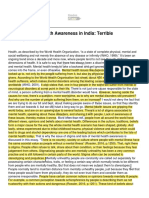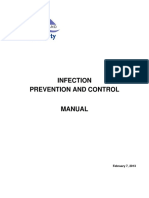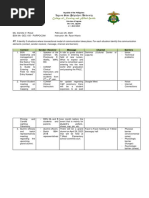0 ratings0% found this document useful (0 votes)
110 viewsThe Facts About Mental Illness in The Elderly
The Facts About Mental Illness in The Elderly
Uploaded by
astha singhThe document discusses mental illness in the elderly, providing statistics showing that about 20% of seniors experience some form of mental health issue but nearly 1/3 do not receive treatment. It then lists the most common issues as dementia, depression, and anxiety. Potential causes of mental illness in seniors include physical disability, illness, medication interactions, and loss. Finally, it provides 10 symptoms of mental illness in seniors, such as memory loss, social withdrawal, and changes in mood or behavior. Caregivers should watch for these symptoms and seek help from professionals if any occur.
Copyright:
© All Rights Reserved
Available Formats
Download as DOCX, PDF, TXT or read online from Scribd
The Facts About Mental Illness in The Elderly
The Facts About Mental Illness in The Elderly
Uploaded by
astha singh0 ratings0% found this document useful (0 votes)
110 views7 pagesThe document discusses mental illness in the elderly, providing statistics showing that about 20% of seniors experience some form of mental health issue but nearly 1/3 do not receive treatment. It then lists the most common issues as dementia, depression, and anxiety. Potential causes of mental illness in seniors include physical disability, illness, medication interactions, and loss. Finally, it provides 10 symptoms of mental illness in seniors, such as memory loss, social withdrawal, and changes in mood or behavior. Caregivers should watch for these symptoms and seek help from professionals if any occur.
Original Title
r kh
Copyright
© © All Rights Reserved
Available Formats
DOCX, PDF, TXT or read online from Scribd
Share this document
Did you find this document useful?
Is this content inappropriate?
The document discusses mental illness in the elderly, providing statistics showing that about 20% of seniors experience some form of mental health issue but nearly 1/3 do not receive treatment. It then lists the most common issues as dementia, depression, and anxiety. Potential causes of mental illness in seniors include physical disability, illness, medication interactions, and loss. Finally, it provides 10 symptoms of mental illness in seniors, such as memory loss, social withdrawal, and changes in mood or behavior. Caregivers should watch for these symptoms and seek help from professionals if any occur.
Copyright:
© All Rights Reserved
Available Formats
Download as DOCX, PDF, TXT or read online from Scribd
Download as docx, pdf, or txt
0 ratings0% found this document useful (0 votes)
110 views7 pagesThe Facts About Mental Illness in The Elderly
The Facts About Mental Illness in The Elderly
Uploaded by
astha singhThe document discusses mental illness in the elderly, providing statistics showing that about 20% of seniors experience some form of mental health issue but nearly 1/3 do not receive treatment. It then lists the most common issues as dementia, depression, and anxiety. Potential causes of mental illness in seniors include physical disability, illness, medication interactions, and loss. Finally, it provides 10 symptoms of mental illness in seniors, such as memory loss, social withdrawal, and changes in mood or behavior. Caregivers should watch for these symptoms and seek help from professionals if any occur.
Copyright:
© All Rights Reserved
Available Formats
Download as DOCX, PDF, TXT or read online from Scribd
Download as docx, pdf, or txt
You are on page 1of 7
10 Symptoms of Mental Illness in the Elderly
Posted On 07 Oct 2013
By : Sarah Stevenson
Tag: mental illness in seniors, mental illness in the elderly
Tweet
219
inShare24
How do you know if your loved one is experiencing symptoms of mental illness or just
the normal changes of older age? Get the facts on mental illness in the elderly during
Mental Illness Awareness Week.
Did you know that about 20 percent of
adults aged 55 or older have experienced some type of mental health concern, but
nearly one in three of those seniors do not receive treatment? (CDC; National Institute
of Mental Health) The statistics on mental illness in seniors are sobering, but with
knowledge and vigilance, caregivers can stay aware of the mental and emotional
health of their older loved ones and make sure they get properly treated if they are
experiencing a problem. This week is Mental Illness Awareness Week, and there’s no
better time to get educated on mental illness in seniors: the facts, the causes, and the
symptoms to watch out for.
The Facts About Mental Illness in the Elderly
You might not be surprised to read that the most common mental health issue among
the elderly is severe cognitive impairment or dementia, particularly caused by
Alzheimer’s disease (National Alliance on Mental Illness). An estimated 5 million
adults 65 and older currently have Alzheimer’s disease—about 11 percent of seniors,
according to the Alzheimer’s Association. Other types of dementia bring the numbers
even higher.
Depression and mood disorders are also fairly widespread among older adults, and
disturbingly, they often go undiagnosed and untreated. In a 2006 survey, 5% of
seniors 65 and older reported having current depression, and about 10.5% reported a
diagnosis of depression at some point in their lives (CDC).
Often going along with depression in many individuals, anxiety is also one of the
more prevalent mental health problems among the elderly. Anxiety disorders
encompass a range of issues, from obsessive-compulsive disorder (including hoarding
syndrome) to phobias to post-traumatic stress disorder (PTSD). About 7.6% of those
over 65 have been diagnosed with an anxiety disorder at some point in their lives,
reports the CDC.
Causes and Risk Factors for Senior Mental Illness
One of the ongoing problem with diagnosis and treatment of mental illness in seniors
is the fact that older adults are more likely to report physical symptoms than
psychiatric complaints (CDC). However, even the normal physical and emotional
stresses that go along with aging can be risk factors for mental illnesses like anxiety
and depression. The Geriatric Mental Health Foundation lists a number of potential
triggers for mental illness in the elderly:
Physical disability
Long-term illness (e.g., heart disease or cancer)
Dementia-causing illness (e.g. Alzheimer’s disease)
Physical illnesses that can affect thought, memory, and emotion (e.g. thyroid or
adrenal disease)
Change of environment, like moving into assisted living
Illness or loss of a loved one
Medication interactions
Alcohol or substance abuse
Poor diet or malnutrition
Is it Mental Illness or Aging? 10 Symptoms of Mental
Illness
As our loved ones age, it’s natural for some changes to occur. Regular forgetfulness is
one thing, however; persistent memory loss or cognitive impairment is another thing
and potentially serious. The same goes for extreme anxiety or long-term depression.
Caregivers should keep an eye out for the following warning signs, which could
indicate a mental health concern:
1. Sad or depressed mood lasting longer than two weeks
2. Social withdrawal; loss of interest in things that used to be enjoyable
3. Unexplained fatigue, energy loss, or sleep changes
4. Confusion, disorientation, problems with concentration or decision-making
5. Increase or decrease in appetite; changes in weight
6. Memory loss, especially recent or short-term memory problems
7. Feelings of worthlessness, inappropriate guilt, helplessness; thoughts of suicide
8. Physical problems that can’t otherwise be explained: aches, constipation, etc.
9. Changes in appearance or dress, or problems maintaining the home or yard
10.Trouble handling finances or working with numbers
Don’t hesitate to seek help if your loved one is experiencing any of the symptoms
above, urges the Geriatric Mental Health Foundation. There are professionals out
there willing and able to help, including your family doctor, who is always a good
place to start. You could also consult a counselor, a psychologist, or a geriatric
psychiatrist. The important part is not to stand by and suffer alone. With the combined
efforts of families, caregivers, and mental health professionals, we can help ward off
mental illness in our older loved ones and make sure they are on the right track to
healthy aging.
If you’ve had to cope with mental illness in an older loved one, we invite you to share
your experiences and advice for our readers. Please feel free to join the discussion
below.
More Articles
14 Ways to Help Seniors Avoid Social Isolation
How to Approach Senior Care When a Loved One Has Mental Illness
6 Easy Ways to Reduce Your Dementia Risk
10 Symptoms of Mental Illness in the Elderly posted by Sarah Stevenson
We Can Help! Our local advisors can help your family
make a confident decision about senior living.
Call: 844-290-6814
or
Get
Assistance
About the Author
Sarah J. Stevenson is a writer, artist, editor and graphic designer living in Northern
California. Her visual art has been exhibited around California, and her writing has
appeared in a variety of web sites and print publications. In addition to writing about
older adults, she also writes for younger ones--her first novel for young adults, THE
LATTE REBELLION, was published in 2011 by Flux. For more information, please
visit: http://www.sarahjamilastevenson.comView Sarah's Google Profile.
Please share your thoughts or comments on this article:
Incoming search terms:
mental illness in the elderly
elderly mental health
mental illness in elderly
Find Senior Care in Your Area
Go!
We value your privacy. By clicking you agree to the terms and conditions of our privacy policy. You also consent that we can reach out
to you using an auto-dialing-capable phone system. Your consent is not required to use our service.
MOST POPULAR
RECENT
Dementia Care Dos & Don'ts: Dealing with Dementia Behavior Problems
Posted On 14 Jan 2016
Anosognosia and Alzheimer's
Posted On 22 Mar 2016
8 Expert Tips for When Aging Parents Won't Listen
Posted On 25 Feb 2015
Communication Strategies for Dementia
Posted On 09 Oct 2015
Is a Cruise Ship Retirement Cheaper than Assisted Living?
Posted On 09 Feb 2015
NEWSLETTER SIGNUP
Get the latest tips, news, and advice on aging and caregiving.
JOIN OUR EVER GROWING COMMUNITY
CATEGORIES
Senior Living Trends
Assisted Living Communities
Aging + Health News
Retirement Finance Legal
Insurance, Medicare + Veterans Benefits
Alzheimer's + Dementia News
Families, Seniors + Caregiving
Senior Nutrition + Recipes
Pet Friendly Assisted Living
Inspiration Quotes
Senior Living Industry News
Careers in Eldercare
Data Insights
Featured
For Professionals
A Place for Mom Senior Living Blog
Family Testi
You might also like
- Solutions For Problems and Exercises Basic Engineering Circuit Analysis 12th Edition by Irwin & NelmsDocument22 pagesSolutions For Problems and Exercises Basic Engineering Circuit Analysis 12th Edition by Irwin & Nelmssmtb98No ratings yet
- LESSON PLAN Rungal 2Document31 pagesLESSON PLAN Rungal 2astha singhNo ratings yet
- Underwater Heritage Management in BermudaDocument79 pagesUnderwater Heritage Management in BermudalilliazevedoNo ratings yet
- A Study of Low Leakage Failure Mechanism of X7R Multiple Layer Ceramic Capacitor MLCCDocument5 pagesA Study of Low Leakage Failure Mechanism of X7R Multiple Layer Ceramic Capacitor MLCCvray3494No ratings yet
- Level Control (CLCS) Control Unit, Component DescriptionDocument1 pageLevel Control (CLCS) Control Unit, Component Descriptionrudi100% (1)
- Final Graphic CommDocument46 pagesFinal Graphic Commatiq jalilNo ratings yet
- The Increasing of The Depression in The AdolescenceDocument10 pagesThe Increasing of The Depression in The AdolescenceTrevorNo ratings yet
- The Stigma of Mental IllnessDocument15 pagesThe Stigma of Mental IllnessJulie HechanovaNo ratings yet
- Mental HealthDocument43 pagesMental HealthJohn Lister Candido Mondia100% (1)
- Changing Minds: The go-to Guide to Mental Health for Family and FriendsFrom EverandChanging Minds: The go-to Guide to Mental Health for Family and FriendsNo ratings yet
- Healthdirect au-WPS OfficeDocument13 pagesHealthdirect au-WPS Officeomarmamluky254No ratings yet
- Facts For Teens: Depression: Toll-Free: 1-866-SAFEYOUTH (1-866-723-3968) TTY: 1-800-243-7012 FAX: 301-562-1001Document7 pagesFacts For Teens: Depression: Toll-Free: 1-866-SAFEYOUTH (1-866-723-3968) TTY: 1-800-243-7012 FAX: 301-562-1001krezeojNo ratings yet
- Mental HealthDocument4 pagesMental HealthJihan Izzatun NisaNo ratings yet
- Mental HealthDocument10 pagesMental HealthMohammad SahedNo ratings yet
- Duals of Every Race, Ethnic Background, Education Level, and Income Level. The Good News Is That It Can ofDocument3 pagesDuals of Every Race, Ethnic Background, Education Level, and Income Level. The Good News Is That It Can ofjackdawasc07No ratings yet
- The Stigma of Mental Illnesses EssayDocument6 pagesThe Stigma of Mental Illnesses EssayClaraNo ratings yet
- Aging Gracefully: Understanding And Overcoming Depression In Older AgeFrom EverandAging Gracefully: Understanding And Overcoming Depression In Older AgeNo ratings yet
- Mental Health Includes Our EmotionalDocument6 pagesMental Health Includes Our Emotionallysa embiadoNo ratings yet
- Minds Fading Away : Alzheimer's And Dementia GuideFrom EverandMinds Fading Away : Alzheimer's And Dementia GuideRating: 5 out of 5 stars5/5 (1)
- Mental Health Resource Guide for Families and IndividualsDocument98 pagesMental Health Resource Guide for Families and IndividualsCarlyn Viloria LaGoyNo ratings yet
- The Aging Brain and What The Faith Community Can DoDocument36 pagesThe Aging Brain and What The Faith Community Can DoNorma J. Goodwin, MDNo ratings yet
- Mental Health FAQ - CSVDocument39 pagesMental Health FAQ - CSVsanchijain83No ratings yet
- Alzheimer's DiseaseDocument5 pagesAlzheimer's DiseaseDianne MacaraigNo ratings yet
- MENTAL HEALTH PRESENTATIONDocument3 pagesMENTAL HEALTH PRESENTATIONClara CerveraNo ratings yet
- Psychology, Help) All About DepressionDocument27 pagesPsychology, Help) All About Depressionprabu2125No ratings yet
- Modern Anti Depression Management, Recovery, Solutions and Treatment: A Guidebook for healing, mindfulness & understanding depression in relationships, men & women, husbands, teenagers, kids, etc.From EverandModern Anti Depression Management, Recovery, Solutions and Treatment: A Guidebook for healing, mindfulness & understanding depression in relationships, men & women, husbands, teenagers, kids, etc.No ratings yet
- Alzheimers and DementiaDocument9 pagesAlzheimers and DementiaraguramrNo ratings yet
- How Psychological Health Affects Your Physical Health: Toxic People Are No Good For YouFrom EverandHow Psychological Health Affects Your Physical Health: Toxic People Are No Good For YouNo ratings yet
- TheImportance of Mental AwarenessDocument5 pagesTheImportance of Mental AwarenessLEAZ CLEMENA100% (1)
- Mental Health and Well Being in Middle andDocument23 pagesMental Health and Well Being in Middle andGlerick NagnubasNo ratings yet
- Significance of Mental HealthDocument2 pagesSignificance of Mental HealthKhadija SultanNo ratings yet
- Depression: 745 Fifth Avenue, Suite 900 New York, NY 10151 601 E Street, NW Washington, DC 20049Document10 pagesDepression: 745 Fifth Avenue, Suite 900 New York, NY 10151 601 E Street, NW Washington, DC 20049Adriana GeorgescuNo ratings yet
- Depression in Older Adults: The Expert Consensus Guideline SeriesDocument12 pagesDepression in Older Adults: The Expert Consensus Guideline SeriesLaura Paola Urquizo100% (1)
- Lack of Mental Health Awareness in India Terrible ConsequencesDocument3 pagesLack of Mental Health Awareness in India Terrible ConsequencesSomya BansalNo ratings yet
- CCC C: CCCCCCC CCC CC CCC C CC CCCC CCC C CCCC CCCCCCCDocument4 pagesCCC C: CCCCCCC CCC CC CCC C CC CCCC CCC C CCCC CCCCCCCMaldini NyachNo ratings yet
- Mental Illness and The FamilyDocument4 pagesMental Illness and The FamilyShenali NadeeshaNo ratings yet
- Caring For Someone With DementiaDocument45 pagesCaring For Someone With DementiaTony Abott100% (4)
- Depression PDFDocument16 pagesDepression PDFMakmur SejatiNo ratings yet
- Common DiseasesDocument216 pagesCommon DiseasesNoman AslamNo ratings yet
- Ingles 7Document3 pagesIngles 7Cleyder Esqueche chancafeNo ratings yet
- Presentation PPDocument21 pagesPresentation PPapi-416398508No ratings yet
- Geriatric Anxiety BrochureDocument16 pagesGeriatric Anxiety Brochurevenus_in_restraintsNo ratings yet
- ZHOPE Mental Health Awareness PresentationDocument13 pagesZHOPE Mental Health Awareness PresentationjuliamalloryNo ratings yet
- Soul SicknessDocument5 pagesSoul SicknessAmeera ElezabyNo ratings yet
- The Path Out of the Dark Phase ( Understanding the Power of God in Helping You Overcome Depression)From EverandThe Path Out of the Dark Phase ( Understanding the Power of God in Helping You Overcome Depression)Rating: 5 out of 5 stars5/5 (1)
- Teen Depression and Suicide: Review ofDocument9 pagesTeen Depression and Suicide: Review ofZam-zamNo ratings yet
- Mental HealthDocument3 pagesMental Healthapi-293693569No ratings yet
- Mental HealthDocument2 pagesMental HealthLilian Lorena BermudezNo ratings yet
- NCM 114-Reaction PaperDocument2 pagesNCM 114-Reaction PaperJennica BubanNo ratings yet
- Open Letter RevisionDocument5 pagesOpen Letter Revisionapi-493439956No ratings yet
- Critical Analysis of Four Dissociative Disorders and Counselling ImplicationsDocument7 pagesCritical Analysis of Four Dissociative Disorders and Counselling Implicationsgykumbuti3No ratings yet
- Mental Illness and The BrainDocument48 pagesMental Illness and The BrainJezabel MascioNo ratings yet
- What Is Depression?: o o o o o oDocument6 pagesWhat Is Depression?: o o o o o oEmersonNo ratings yet
- Breaking The Stigma, Myth of Mental IllnessDocument2 pagesBreaking The Stigma, Myth of Mental IllnessRap TacandongNo ratings yet
- Cg601 Research Talaman EduardoDocument232 pagesCg601 Research Talaman EduardoEdward TalamanNo ratings yet
- Depression in Older PeopleDocument4 pagesDepression in Older PeopleAlina AlinaNo ratings yet
- Performance Task in Personal Development (Depression) : Submitted By: Submitted ToDocument6 pagesPerformance Task in Personal Development (Depression) : Submitted By: Submitted ToJanea Arinya100% (1)
- Types of Mental Illness: Anxiety Disorders Mood Disorders Schizophrenia and Psychotic Disorders Dementia Eating DisordersDocument4 pagesTypes of Mental Illness: Anxiety Disorders Mood Disorders Schizophrenia and Psychotic Disorders Dementia Eating DisordersZakiah AmmarNo ratings yet
- Mental Illnesses in Children and Youth: Learn AboutDocument4 pagesMental Illnesses in Children and Youth: Learn AboutStefan BasilNo ratings yet
- Teen Depression: Why Do Adolescents Get Depression?Document4 pagesTeen Depression: Why Do Adolescents Get Depression?SOME tingssNo ratings yet
- Depression Basics: Understanding the Basics to Manage and Overcome DepressionFrom EverandDepression Basics: Understanding the Basics to Manage and Overcome DepressionNo ratings yet
- Screenshot 2023-11-30 at 3.27.57 PMDocument3 pagesScreenshot 2023-11-30 at 3.27.57 PMastha singhNo ratings yet
- PhobiaDocument17 pagesPhobiaastha singhNo ratings yet
- Submitted To Submitted by DR - Ratna Prakash Ms. Astha Singh (Principal) (M.SC (N) 2 Year)Document40 pagesSubmitted To Submitted by DR - Ratna Prakash Ms. Astha Singh (Principal) (M.SC (N) 2 Year)astha singhNo ratings yet
- PhobiaDocument43 pagesPhobiaastha singhNo ratings yet
- Contribution of Swami Vivekananda For Imparting Value Education in Present ScenarioDocument2 pagesContribution of Swami Vivekananda For Imparting Value Education in Present Scenarioastha singhNo ratings yet
- Lesson Plan ON Dissociative Disorder: Submitted To: Submittted byDocument16 pagesLesson Plan ON Dissociative Disorder: Submitted To: Submittted byastha singh100% (1)
- Essential Care of Newborn at BirthDocument32 pagesEssential Care of Newborn at Birthastha singh100% (1)
- Dissociative Dis, SeminarDocument11 pagesDissociative Dis, Seminarastha singh100% (1)
- Sample Size CalculationDocument13 pagesSample Size Calculationastha singhNo ratings yet
- Educational Aims and ObjectivesDocument5 pagesEducational Aims and Objectivesastha singhNo ratings yet
- Dissociative Fugue (Psychogenic Fugue)Document9 pagesDissociative Fugue (Psychogenic Fugue)astha singhNo ratings yet
- Infection Control ManualDocument206 pagesInfection Control Manualastha singhNo ratings yet
- Astha ArticleDocument11 pagesAstha Articleastha singhNo ratings yet
- A Study ON Impact OF Social Media Marketing and Advertising ON Consumer Buying BehaviourDocument44 pagesA Study ON Impact OF Social Media Marketing and Advertising ON Consumer Buying Behaviourjeel rabadiya100% (6)
- Consumo de Medios de MoliendaDocument11 pagesConsumo de Medios de MoliendaDaniel Alvarez VegaNo ratings yet
- IO-LinkDeviceLibrary ReleaseNotes v2.1.00Document13 pagesIO-LinkDeviceLibrary ReleaseNotes v2.1.00Leonardo Niño RuizNo ratings yet
- 2020 Insider Threat Report GuruculDocument24 pages2020 Insider Threat Report GuruculAlina PakNo ratings yet
- For A Green Cause Pursuing Their Dream! Music For A Good CauseDocument20 pagesFor A Green Cause Pursuing Their Dream! Music For A Good CauseSunway UniversityNo ratings yet
- 4.000 CFM, 0.4 Inchwg - TDA LDocument1 page4.000 CFM, 0.4 Inchwg - TDA Ldadan solihinNo ratings yet
- 09000002807b0dfc 09000002807b0dfcDocument30 pages09000002807b0dfc 09000002807b0dfccitationxpilot85No ratings yet
- Dangerous Goods Hazmat Material Training Cat-10Document24 pagesDangerous Goods Hazmat Material Training Cat-10Claudio GonzalezNo ratings yet
- Catalogo Hino 700 - ZF 16s151Document54 pagesCatalogo Hino 700 - ZF 16s151Lucio Pando100% (2)
- Lesson PlanDocument3 pagesLesson PlanMohammedBaouaisseNo ratings yet
- Lesson PlansDocument6 pagesLesson PlanscfuertesNo ratings yet
- Shell Gadus S5 T460 1 5 TDSDocument2 pagesShell Gadus S5 T460 1 5 TDSSuresh RajanNo ratings yet
- FRQ Review 2 - W - Teacher NotesDocument5 pagesFRQ Review 2 - W - Teacher NotesNoor FarhanNo ratings yet
- Robotics CourseDocument2 pagesRobotics CoursevoldezNo ratings yet
- Anatomy of Thoracic WallDocument27 pagesAnatomy of Thoracic WallSamuel Pola Karta Sembiring100% (1)
- Fuses w203Document7 pagesFuses w203faraji mustapha0% (1)
- Verb Tense Summary: P R E S E N TDocument2 pagesVerb Tense Summary: P R E S E N TZulamov BobanNo ratings yet
- Midterm - Formative Assessment No. 1Document2 pagesMidterm - Formative Assessment No. 1AirahNo ratings yet
- Adobe Scan Apr 09, 2024Document14 pagesAdobe Scan Apr 09, 2024aadritadam2004No ratings yet
- Module 3Document7 pagesModule 3Wayne De Vergara PalaypayonNo ratings yet
- CS425 Assignment 5 - Object and Location Recognition: Magdalena Mazur 89739015 April 8th, 2008Document4 pagesCS425 Assignment 5 - Object and Location Recognition: Magdalena Mazur 89739015 April 8th, 2008magreeNo ratings yet
- MCG 9 Conference ProceedingsDocument248 pagesMCG 9 Conference ProceedingsSilver Samuel Palacios PaulinoNo ratings yet
- BTCO13701 Compiler DesignDocument4 pagesBTCO13701 Compiler Designabhishekradadiya0749No ratings yet
- Aktivator 5Document30 pagesAktivator 5Luxubu HeheNo ratings yet
- Gec 105-PT1Document2 pagesGec 105-PT1Daniela Villanueva RosalNo ratings yet
- Third Year B Pharmacy SyllabusDocument20 pagesThird Year B Pharmacy SyllabusSidhharrth S KumaarNo ratings yet







































































































